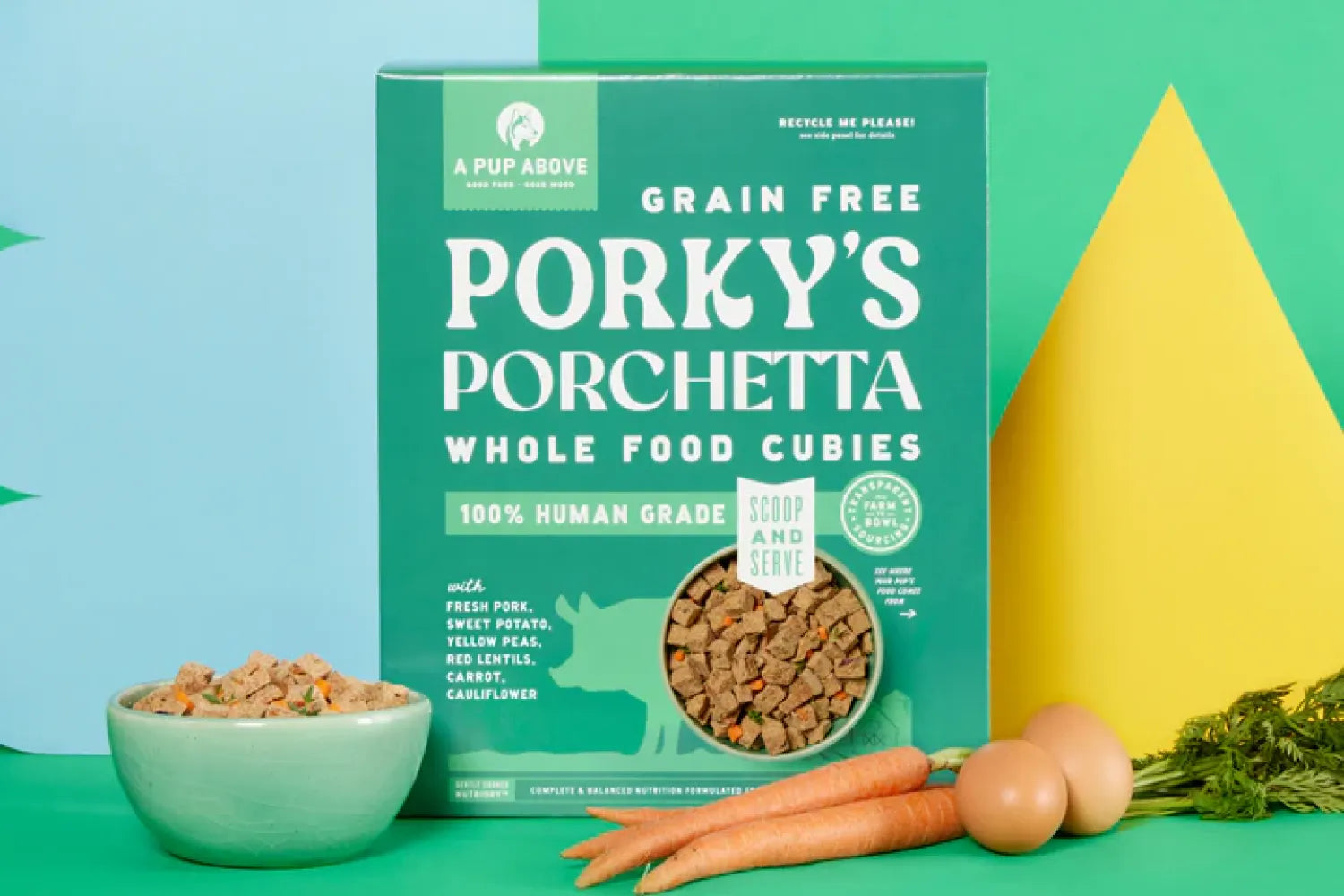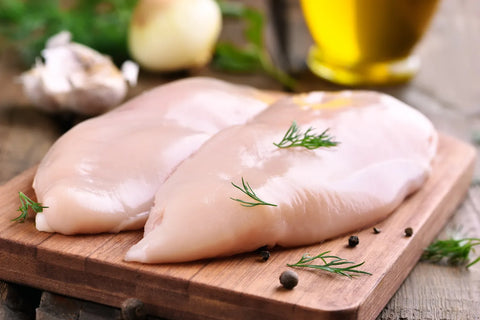
Best High-Protein Dog Foods and Their Benefits
High-protein diets are crucial for making sure our dogs stay happy and healthy. As pet owners, ensuring our dogs receive adequate protein supports their muscle development and contributes to keeping their overall energy levels up.
In the world of dog nutrition, selecting the right protein sources can significantly impact their diet's quality and effectiveness. Let’s take a close look at high-protein dog foods, focusing on the benefits of various protein types like beef, pork, turkey, and chicken.
Whether you're considering a switch to a high-protein diet or looking to optimize your dog's current food regimen, understanding more about these protein sources and their specific advantages is key.
What Are the Benefits of High-Protein Dog Foods?
High-protein dog foods offer a range of benefits that support the overall well-being of our dogs. Protein is a vital nutrient that is essential for muscle development, tissue repair, and maintaining a strong immune system in dogs.
This section will cover some key benefits of incorporating high-protein foods into your dog's diet.
Amino Acids
Proteins derived from sources like beef, pork, turkey, and chicken provide essential amino acids that dogs cannot produce on their own. These amino acids promote healthy growth and development and are crucial for building and repairing tissues, supporting muscle strength, and ensuring proper organ function.
Energy Levels and Stamina
Also, high-protein diets can contribute to increased energy levels and improved stamina in active dogs. Protein-rich meals help sustain energy throughout the day, making them ideal for working dogs, athletes, or those with high activity levels.
Coat and Skin Maintenance
Protein plays a key role in maintaining a healthy coat and skin. Adequate protein intake supports the production of keratin, a protein that’s needed for healthy skin cells and fur growth. Having enough keratin in their diet can help your pup maintain a shiny coat and reduce the risk of dryness or irritation.
Metabolism and Satiety
Finally, proteins help regulate metabolism and promote satiety, which can aid in weight management and prevent obesity-related health issues in dogs.
What Kind of Protein Should I Feed My Dog?
Now that we’ve talked about why protein is important in a dog’s diet, let’s dive into four specific types of protein you can give your pup.
Beef
Beef protein is a popular choice in dog food due to its rich amino acid profile and palatability. Dogs benefit from beef protein because it contains high levels of essential amino acids like lysine and leucine, which are crucial for muscle growth and maintenance. These amino acids also support immune function by aiding in the production of antibodies that fight infections.
Beef protein is also highly digestible for most dogs. This makes it a great choice for those with sensitive stomachs. It also provides a source of energy that helps active dogs sustain their stamina throughout the day.
When selecting beef protein for your dog, look for high-quality sources that prioritize lean cuts to maintain a healthy balance of protein and fat such as our A Pup AboveTexas Beef Stew fresh food. This will make sure your dog receives the benefits of beef protein without excessive calories or potential digestive issues.
Pork
Pork protein is another nutritious option for dogs because it offers a range of essential nutrients and a savory flavor that many dogs can’t get enough of. Pork is rich in B vitamins such as thiamine, riboflavin, and niacin, which support metabolism, energy production, and a healthy nervous system in dogs.
These vitamins will contribute to your pup’s overall well-being. Also, pork protein contains essential minerals like zinc and selenium, which are important for immune function, skin health, and wound healing in dogs. These minerals help maintain healthy skin and a shiny coat.
When incorporating pork protein into your dog's diet, opt for lean cuts that are low in fat while still being high in protein. This helps prevent obesity and related health issues while providing the benefits of high-quality pork protein for your pup. You can easily incorporate pork into your dog’s diet by giving them our Porky’s Porchetta dry food.
Turkey
Another nutritious option for dogs is turkey protein because it offers lean meat packed with essential nutrients. It is known for its high protein content and is also rich in amino acids like tryptophan and lysine. These acids are important for muscle growth, immune function, and the production of serotonin.
Turkey protein is highly digestible for most dogs. For this reason, it’s a good choice for those with sensitive stomachs or food allergies. It provides a source of energy that helps active dogs maintain their stamina throughout the day.
It’s also good to keep in mind that turkey is lower in fat than other meats like beef, making it an ideal protein source for dogs needing a leaner diet. When selecting turkey protein for your dog's diet, choose high-quality sources like our Turkey Pawella fresh food that avoids additives or fillers.
Chicken
Chicken protein is a widely used and well-liked protein source in dog food due to its high digestibility and palatability. It is rich in protein and consequently offers a complete amino acid profile that supports muscle development and maintenance in dogs of all ages.
Chicken contains nutrients like phosphorus and selenium, which contribute to bone health, immune function, and your pup’s overall health. Another big benefit of chicken protein is that it’s relatively low in fat.
Much like turkey, it’s great for pups who require a leaner diet to maintain a healthy weight. When choosing chicken for your dog, look for high-quality sources that avoid processed forms or excessive seasoning, such as our Chicka Pupatouille dry food.
Should You Give Your Dog Fresh or Dry Food?
When deciding between fresh and dry dog food, understanding the benefits and considerations of each can help you make the best choice for your dog.
Fresh Dog Food
Fresh dog food typically comes in cans or pouches and contains higher moisture content than dry kibble. This higher moisture level can be beneficial for dogs who struggle to stay hydrated or have specific dietary needs. The soft texture of fresh food makes it easier for puppies, senior dogs, or those with dental issues to chew and digest.
One of the key advantages of fresh dog food is its palatability. Many dogs find fresh food more flavorful and appealing due to its aroma and texture. It can also be beneficial for dogs needing to gain weight or those recovering from illness because it often contains higher protein and fat content than dry kibble.
Dry Dog Food
Dry dog food, or kibble, is convenient and widely available. It has a longer shelf life and easier storage than fresh food. Dry dog food is often formulated to provide a balanced diet with essential nutrients like protein, carbohydrates, vitamins, and minerals.
It tends to be more calorie-dense than fresh food, which makes it a great option for active dogs or those needing to maintain a healthy weight.
Wrapping Up
When looking for the ideal food for your pup, take into account their preferences, age, dietary needs, and any allergies they may have. Look for high-quality dog food that contains a nutritious source of protein, such as beef, pork, turkey, or chicken.
If you’re struggling to decide between a fresh or dry food diet for your pup, you can always talk to a veterinarian to make the best choice possible for your dog’s well-being.
Sources:
Amino Acids in Dog Nutrition and Health | NIH
Top Stories

Why Do Dogs Lick Their Paws?

Why Do Dogs Whimper & Make Noises in Their Sleep?

Healthy Vet-Approved Homemade Dog Food Recipes

How To Cook Sweet Potatoes for Dogs






















